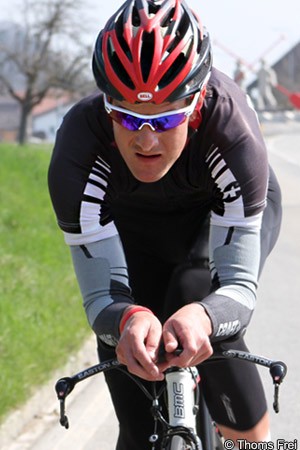Swiss rider pledges to maintain transparency into future
 Describing his primary goal as proving that he can achieve results without using banned substances, former Astana and BMC Racing Team rider Thomas Frei has reached the end of his two year suspension and is now eligible to compete once again.
Describing his primary goal as proving that he can achieve results without using banned substances, former Astana and BMC Racing Team rider Thomas Frei has reached the end of his two year suspension and is now eligible to compete once again.
“I’m excited to think that after this difficult time of pain, sacrifice and hard work, I will be able to race again,” he told VeloNation today. “I have no idea yet what my first race will be, but my goal is to show that I can be successful while also clean and transparent.”
The Swiss rider’s career came under serious threat when Frei’s previous BMC Racing Team announced on April 22nd 2010 that he had provided an A-sample which was positive for EPO.
The rider quickly admitted his guilt, saying that he had used the substance several times during a one year period.
He added that if he had been more careful, he could have beaten the out of competition control that nabbed him.
“If I had drank one liter of water after the injection, I would now be preparing myself for the Giro,” he stated at the time, referring to microdosing and the possibility of cheating the tests by consuming large amounts of fluids.
Frei spoke to anti-doping officials about how he and other riders would remain under the radar. Although he reportedly didn’t name names, he gave other information that was useful in fighting doping. He also worked with the Mapei Centre during his ban to track biological parameters.
This data was printed publically and linked to from his Twitter account to show that he was training clean, and also working hard.
Now 27 years of age, Frei had been making solid progress until he was suspended. Since then he’s undoubtedly had tough moments, but said that personal and professional support from others helped see him through.
“The important things are my family and my friends, they are there for me in this hard time,” he explained to VeloNation. “Also important was the work with my coach Andrea Morelli from Mapei Sport; he gave me his trust and showed me how to improve with hard work. The chance I had to work with him gave me a lot of motivation.
“I also gained a lot of motivation from seeing the improvements I made with this new training.”
Rebuilding from zero:
The Mapei Centre was run by Aldo Sassi until his death in December 2010, and has built a reputation of doing things in an ethical way. Sassi’s work with Ivan Basso helped the Italian return after his ban, and to be accepted by both his fellow professionals and also fans of the sport.
After his positive test, Frei worked with the same center, knowing he had to earn trust. “I visited the centre every month or so, and we [Morelli and himself] were in daily contact to plan training,” he said. “I also underwent blood tests where they did mass hemoglobin measurements, and I also did physical tests. These can all be seen online.”
In doing that, Frei has done considerably more than many other riders who have been sidelined. The default action for most is to deny using banned substances and, if they can’t sidestep punishment, to then keep their heads down until such time as they can return.
Frei has chosen to do things differently, being open about the errors he made and also about how he is trying to put things right.
Of course, it could be argued that as he doesn’t have the results of riders such as Alexandre Vinokourov and Alejandro Valverde, who were also banned in recent years, he therefore has to work harder to convince teams that he should be given a chance.
Still, he insists that being an example is an important part of his motivation. It’s a path that David Millar also followed when he returned, and that sort of stance is something that Frei says he wants to maintain into the future.
“For sure I will continue the transparent way,” he said, asked if the release of information would persist after the point when he secures a new contract. “I think that can also be interesting for the fans and the people who are interested in cycling to see training data, physical tests, hemoglobin mass and biological passport data from a pro rider.”
So how confident is he that the measures he has taken will help him secure a new deal? “Time will tell,” he answered. “I think Mapei [the Mapei centre] has a good reputation in this fight against doping, so I think it can be helpful. They have an [important] word if they can explain about my fitness and about we worked during the ban. I think that’s important.”
Frei said on Twitter today that he hoped to be in a position soon to tell fans about a new team. One interpretation of that is that he might already have had a deal worked out but to not yet be in a position to reveal it; however he clarified things to VeloNation, confirming that things were still ongoing.
“At the moment there’s nothing finalized,” he said. “We have some contacts but at the end its not allowed for teams to sign banned riders [until the suspension has ended – ed.], so we also will follow this rule.
“I hope we can have some talks in the next couple of weeks, and hopefully I can find a new team.”